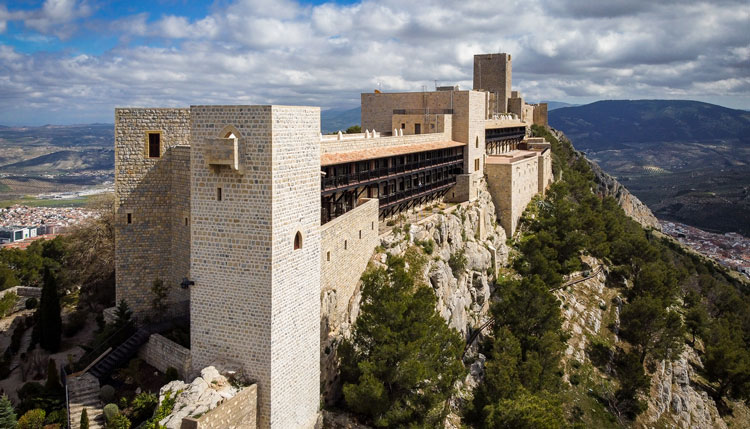Luis Tejedor
Prized by gods and men for centuries, olive oil is more than a treasure. Committed to quality Spanish products, Paradores has made Extra Virgin Olive Oil (AOVE) its flagship of gastronomic excellence.
There is something about olive oil that brings us closer to divinity. In the Bible, God chose an olive branch as a sign of forgiveness after the flood. This oil anointed the old kings of Israel, and it is still used to anoint the newborns and the dead. Maybe that is what makes it such a pure delight when it touches our food.

As civilization stumbled along the shores of the Mediterranean Sea, the juice of olives, their quintessence, had already found its way on the dinner tables and altars.
Bread, wine, and oil fill the space between Ulises and Jesus Christ. Brought to the south of Spain by the Romans, it owes its name (aceite) to the Arabs, who called it az-zayt.
And they must have loved it because they named most of the things related to its production and consumption. If naming is a way of claiming ownership, we thank them for the great pleasure olives grant us. We have turned their knowledge into the foundation of Spanish cuisine, aka, Extra Virgin Olive Oil, the mythical AOVE.

AOVE is not just oil. Only the product of the utmost quality, with a level of acidity under 1%, gets the honor of that name. Moreover, this olive juice, immaculate and sublime, in glorious fullness of all its merits, is extracted using both traditional methods and innovative machinery.
For every liter of extra virgin olive oil, you need no less than ten kilos of olives. This juice only aspires to become AOVE if the olives are harvested on time and in the right way.
They are harvested before they reach their full ripeness and transferred to the oil mill quickly so that, with care and skill, the soul can be extracted from each of the fruits.
Immaculate, this oil is free from sensory defects. Each drop, an intense green color and unmistakable flavor, is reminiscent of freshly picked olives. Each of the over 260 different varieties adding its own nuances to the final result.
 Whether raw or cooked, choosing AOVE is no easy task. Only true gourmets know how to expertly pick the correct variety so that the varied palette of flavors and aromas compliments their dish.
Whether raw or cooked, choosing AOVE is no easy task. Only true gourmets know how to expertly pick the correct variety so that the varied palette of flavors and aromas compliments their dish.
For fried food, the recommended oil comes from the arbequina; for stews, the picuda; and to dress your salads nothing like the hojiblanca.
Many recipes, blogs, and chefs use the acronym to catch their customers’ eye.
Paradores, one step ahead

The only way to show love is loving. Paradores loves Spanish cuisine and so has made extra virgin olive oil its flagship, and the Network displays it proudly. Rosa Díaz, the Network’s Head of Catering, explains that Paradores “was the first hotel network to use AOVE back in 1992.

We took a step further, going from a good quality olive oil to this product so that every Parador could use it.
Nowadays, we can’t imagine cooking with anything else.” Currently, the kitchens of the Network use an extraordinary oil from Seville, with the Estepa Designation of Origin.
At the Paradores in areas where there are olive oil mills, the Network offers exclusive tastings. “We support local products, and we are proud to teach our customers.

During tastings, we showcase the bottles, explain the varieties, and their defining characteristics.
The ultimate goal is to awaken a taste for the product you have tried so that you can use it in your daily life,” she concludes.

Parador de Jaén, in the land of olive trees
After fifteen months of ambitious reform, the Parador de Jaén reopened its doors on 1 March. Considered the capital of the picual, oil is part of the cuisine and culture of this city. So much so that its gastronomic offer gravitates around this product.


Beyond the simple but always tasty, raw tasting, we find curious elaborations such as the oil ice cream and a spectacular bonbon that we can’t stop thinking about.

Additionally, when in season, the seasoned ergot olive is reason enough to justify a visit to the Parador.







